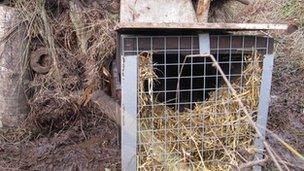Beavers released in Machynlleth enclosure
- Published
Beavers have been extinct in the wild in Wales for probably 400 years.
That's no longer strictly true as two female European beavers have been introduced into a 2.5 acre enclosure over the weekend in Cwm Einion near Machynlleth.
These beavers could be the first of many to be "set free" in as natural environment as possible.
They have a pond to live in, secure behind chicken wire, stock fencing, weld mesh and an electric fence.
According to one of the group of conservation volunteers at Blaeneinion Farm their enclosure is "like Fort Knox".
Within minutes of leaving the cage they'd travelled in from the south-west of England, both beavers were swimming and exploring their new home.
They seemed inquisitive and unafraid of the dozen or so people who were watching with interest.
This is a privately funded project to monitor and assess how beavers live and how they might fare as a species if moves to reintroduce them to the wild in Wales next year go ahead.
The Wildlife Trusts Wales are consulting on the benefits of reintroducing this extinct species and will need the approval of the Welsh government and the Countryside Council for Wales.
Sharon Girardi, project manager at Blaeneinion Farm, said the research could involve students from Aberystwyth University and the Beaver Information Exchange for Wales.
"The project has spent many thousands of pounds on the enclosure and taken advice from Derek Gow, the UK's top consultant on beavers," she said.
"As a research and monitoring programme it's in our best interests that we keep the beavers where they can be monitored."
Serious concerns
That cautious statement follows fierce reaction by both farming unions in Wales who oppose any plans to let beavers loose in the wild.
According to the Farmers' Union of Wales' (FUW) land use and parliamentary chairman Richard Vaughan, members had serious concerns.

Those in charge of the project say there is no chance of the beavers escaping into the wild
"We only have to look at the problems associated with the grey squirrel and rabbit, both non-native species, to see the potential for conflict in the future.
"It seems a reintroduction of a species that has not been native to Wales since the 12th Century is crazy."
And the National Farmers Union of Wales (NFU) rural affairs board chairman, Bernard Llewellyn, said: "We have been informed that beavers lived in Wales in the 12th century and then became extinct.
"How can we know that these reintroduced animals have any ancestral link to the 12th Century beavers?"
He said he was aware of beavers escaping from a supposedly secure compound in Scotland and travelling long distances and damaging woodland.
"Some of these beavers in Scotland, we've been informed, are masters at evading capture. Apparently there are individuals opposing any cull of these escaped animals regardless of any damage they are doing to native plants and animals.
Hunted for meat
"We can only hope that the fences erected in Ceredigion will be secure enough to keep this pair in."
Beavers are herbivores and are believed to be extinct in Wales since the 16th Century.
They were commonly found in medieval Wales up until the 12th century and hunted for their pelt and meat.
During the 20th Century they've been successfully reintroduced to more than 20 other European countries.
The Countryside Council for Wales (CCW) said it would be "carefully considering" a report by the Welsh Beaver Assessment Initiative (WBAI), due next month, which will examine the feasibility of reintroducing the beaver into Wales.
"CCW does not want to see funds diverted from current conservation activities to pay for this work, which means that additional resources would need to be found," said a spokesman.
A reintroduction would require a license from the Welsh Government.
Some landowners may view beavers now as non-native species because they've died out.
Other concerns would be how they're known to alter the environment they live in - constructing dams on streams and rivers.
There are also concerns beavers in the wild might carry diseases which could affect other wildlife or cattle and sheep.
For this winter at least it is hoped the two female beavers at Blaeneinion Farm will be content to be monitored in a semi-wild environment.
I would welcome your thoughts and you can get in touch via Twitter at @apdafyddi.
- Published28 March 2011
- Published21 March 2011
- Published7 April 2011